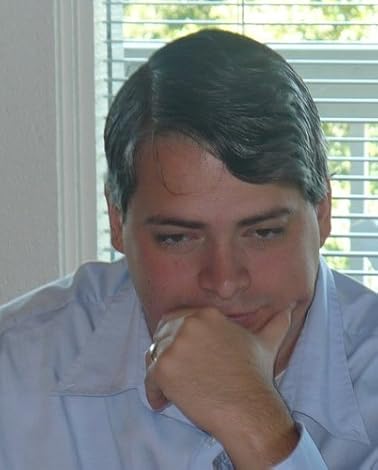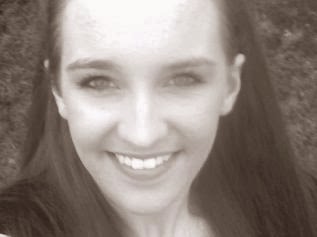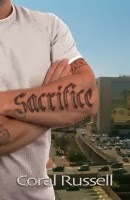Chapter One
Armaros woke up disoriented, trapped in the backseat of a black sedan. His head throbbed. He was uncertain about the time that had elapsed and confused about the handcuffs that tightly bound his hands. Memories of his arrest came rushing back. He was taken into custody in front of his Chicago Yezidi congregation. Now he could be anywhere.
As he lay motionless in the backseat, he noticed his casual dress of khakis and a button-down shirt. The clothes spurred his memory. He was in real trouble. The car had double sunroofs, both open, allowing him to look up at the sky. Wherever he was the skies were bright blue with fluffy white clouds. He propped up his head silently and peered out of the backseat window. He was so hot, an almost impossible feeling. Angels were immune to earthly temperatures of all extremes. It occurred to him where he was and who he was with.
Armaros hadn’t been to this desert in centuries. The law enforcement agent driving the car introduced himself as Agent Gaston back in Chicago, but even then there had been something familiar in an unnatural way. The agent, also the driver, had piercing icy blue eyes, inhuman. Those eyes had the same hue and intensity as Satan’s eyes. Yes, it’s him. How could I have been fooled? Armaros shuddered. Did Master come up from the pit to take me back to Hell?
Pretending to sleep, Armaros racked his mind for a way out. As he stared through the sunroofs, he saw several large scavenger birds swooping through the air. They were abnormally larger than their Earthly counterparts. These supersized flocks fed off of the dead. They were vicious birds. Armaros nearly screamed. He almost forgot about his own powers. He had only seconds before Satan realized he was awake.
One of the birds, a female condor flying fifty yards above him, hissed at the others and then plunged toward the car. Armaros had the bird’s attention.
“Find my congregation. They’re on my island off of the coast of Italy. Listen for their prayers to me. I am Armaros. Bring them here to Chaos. They will save me,” he commanded silently.
The giant, grotesque bird pounced onto the trunk and flew away. Armaros hoped she understood.
Satan looked in the backseat. Armaros tossed and turned, then opened his eyes and saw Satan’s gaze behind the black sunglasses boring into him.
He sat up and acted disorientated. “Nooo,” Armaros shrieked.
Satan lowered his sunglasses and exposed his true face, clay-colored, pocked with pits, scars, and burns. He heinously smiled, showing his double row of canines.
Andel looked out the back window and saw an endless single file line of identical black sedans following them. He continued yelling, putting on a show, although he was truly terrified. Once he thought his feigned shock was convincing, he stopped and watched Satan as he drove.
“You’re sweating. Haven’t been this hot in a while.” Satan smiled. “How long has it been since the temperature bothered you? To think you were once my favorite. I gave you the best of both worlds and you…” Satan paused. “You’ll pay for this rebellion.”
“We’re in Chaos?” Armaros asked.
“Ah, you remember,” Satan answered. Chaos was a vast desert that separated Hell and Earth.
They drove for miles in silence until an enormous black boulder large enough to be mistaken for a small mountain came into view. As they approached, Armaros recognized the infamous landmark. Satan stopped the car and got out. The ninety cars following them stopped and waited in a perfect single-file line. Inside the boulder was the locked entrance to Hell. Satan crawled up the rock like a professional mountain climber and opened up a panel.
While Satan unlocked the entrance, Andel looked up to the rock’s rugged peak. He heard inhuman sounds of wailing and bird squalls. There was his Fallen brother, Azazel, cuffed, chained, and bound to the boulder’s peak. This is Dudael, Hell’s entrance, Armaros recalled. Satan jumped several feet down from the rock and returned to the car. A hidden ramp caked with mounds of sand lowered into the Pit.
“Home sweet home, Armaros. Or do you prefer Andel Talistokov?” Satan drove down the sandy ramp onto the first level of Hell.
Armaros forgot about this level, although he had never spent much time in it. Many referred to this barren, dark region as Purgatory. Satan discouraged all of his angels from visiting the area. It was off-limits per the treaty after he lost the war in Heaven.
Although Purgatory was a hellish place, it was far from Hell. The land extended for thousands of miles with mountains on top of mountains jutting throughout the landscape. The mountains acted as gates, keeping the souls inside. Some would climb over to the other side and be greeted with a bottomless drop into one of the many lakes of fire below where the rest of Hell’s lower levels were located.
Armaros took in the desolate land and remembered how Purgatory served as a foyer before the Pit. The setting was sinister enough to give the undecided souls a taste of what was to come.
Sunlight from Chaos streamed in, giving the souls a taste of natural sunlight. The only other light inside of Purgatory came from fire and molten lava that erupted from scattered volcanoes throughout the mountain range.
“Armaros? Or Andel? Are you listening to me?” Satan asked, perturbed but still in control.
“Of course. It’s been so long. You choose my name, Master,” he answered.
“Armaros, your angelic name, is what you will be called.”
The heat was suffocating, getting warmer as they descended down the ramp. Armaros looked back through the ramp’s opening at Dudael. Ninety black sedans trailed them. He froze in amazement of his own arrogance. There once was a time he believed he could secede from Hell. Not only was he a traitor, but a fool.
A little voice inside of Armaros still fought, not willing to throw in the towel. It’s not over yet. I still got my island, my congregation, my children, and that bird that I sent…Satan is not all-knowing. Maybe the bird will get there in time.
“You see Azazel on top of the rock?” Satan asked.
“Has he been chained…”
“Yes, at least the whole time you’ve been on Earth. There were a few exceptions before that. But only a few of us have the key to his shackles, you, of course, being one of them. Do you still have them? Doesn’t matter. He’s part of the agreement with Him. I remember Raphael chaining him up as if it were yesterday,” Satan answered. “Soon Azazel’s time will be served and he’ll be free.”
Armaros remembered that life-altering battle as if it just happened. The war in Heaven lasted nine days. Their pride, arrogance, and stupidity caused the defeat. He remembered falling from the sky for what seemed forever. Nine days was not and never would be considered a war, but that’s how Satan referred to it. Nine days was more of an insignificant uprising, easily squelched. Satan had eternity to reflect on his mistake, and so did all of his followers.
Many, including Armaros, still held a grudge. Satan assured them that next time would be different. He, his Fallen, and army of lost souls would be better prepared, better equipped, and better trained for another chance.
Armaros had been such a big part of building that army. Because of his innovations within the advertising world, numbers grew exponentially. And now, his usefulness was discounted. Satan once again let his pride supersede logic.
The long ramp eventually leveled out, leading them to the barren outskirts of Purgatory. The ramp stayed down while the others followed. As they drove further away, Armaros studied the swatch of sky from the ramp’s opening. Vultures, condors, and buzzards swarmed around the opening, waiting.
Frequently, souls attempted to escape. If they were smart enough, patient enough, and determined enough, they might slip out of Purgatory and into the desert while the ramp was open. Smelling death, the scavenger birds pounced, consuming what was left of the soul’s physicality. Many witnessed these blood-thirsty birds devouring the escaped.
Rumors spread throughout Purgatory. Souls continued to try, rationalizing that they might not get to Heaven but were spared from Hell. Those who slipped through the ramp’s opening into Dudael never made it past the Chaos Desert. The birds were too quick and too hungry.
As the last sedan drove down the ramp, the passenger, another Fallen angel, got out of the car and turned the key inside of the boulder. The ramp ascended, ending the light. Armaros admired their efficiency. Before the ramp completely closed, a few dozen souls slipped out.
“The birds will eat well today.” Satan headed towards the center of Purgatory.
Sand rained from the ramp, causing a sandstorm. All the cars stopped, closed up the windows, and waited for it to pass.
Armaros looked around Purgatory, surprised by its expansion. It had once been the size and population of a small city suburb. Now tens of thousands meandered through the valleys. Judging by the density of souls by the ramp, he figured over a million had to be stuck there, waiting.
As they drove, Armaros watched some of the souls pray. Others roamed around without destination carrying torches, lanterns, and candles. The fires only made the temperature even more oppressive, but were the only means of avoiding the darkness. Satan and his followers put on their headlights as they approached the spiral highway that led down to the Pit.
Souls who landed in Purgatory did not belong to God or Satan. They had to wait in a combination of spirit and bodily form. They were off limits, untouchable per the divine treaty that Satan was forced to sign after the Fall. Every split second someone was dropped into Purgatory through a one way chute. Next to the chute was the only star in Purgatory’s sky. Souls who were chosen to ascend would rise up to the star and disappear, giving the masses hope. Other souls not as fortunate were thrown into the black hole that a spiral highway was wrapped around. As Satan reached the exit, he’d smile every time a soul was cast into the black hole. His army was growing.
As they circled down the black hole on the spiral highway paved with ash, Armaros noticed the sideshows taking place along the highway’s shoulder. His ears drummed with the sounds of screaming and crying. He watched some dance, fornicate, cackle, scratch, and throw themselves at the cars as they descended. The world was so civilized, sophisticated, and kind in comparison. He had forgotten about the rampant madness.
With every circle they’d complete, they’d reach a deeper level of Hell, nine levels total, including Chaos and Purgatory. The kingdom was designed to sort the souls by their sins, assigning each type of sinner a level to take up residence until he or she was called upon. The lowest levels housed the most despicable sinners.
Each level had a gate with guards and guard houses, preventing souls from drifting into levels they were not damned to live in. Some would explore, but the guards made it almost impossible. Every century or so, a soul would escape their assigned level and make it as far as Chaos only to be greeted by vicious birds. Satan and his angels were the only beings with complete access to all of the kingdom’s levels with the exception of Azazel. Armaros predicted his movements would also be restricted.
The spiraled road grew wider with more lanes. Each level was more heavily populated than Armaros remembered. Resentment burned hotter than the temperature.
Once they reached the bottom of the spiraled road, they were officially in Hell’s capital, Pandemonium. Satan and his followers drove down the main road. The city was reserved for Satan’s castle, his Fallen, most of whom held high military titles, and the world’s most wicked souls.
The city’s architecture used chrome, mirrors, and other reflecting glass and metal, casting images of evil in all directions. Lakes of fire burned around the city’s boundaries, making it somewhat of an island. Satan’s castle sat atop the only hill. Endless blazing torches illuminated the ashen windy road that led to its gates.
Satan pulled into his dealership and dropped off his sedan, pushing Armaros out of the backseat, still cuffed. They stood at the entrance and waited for the others to drop off their sedans. Those who accompanied Satan to Earth were the bulk of his highest ranking soldiers. A few were missing. Like Armaros, they held Earthly charters for similar reasons. Armaros knew who they were. Some had even promised to join him. Where are they now?
Satan motioned to Samael, one of his angels, and directed, “I don’t want him flying.”
Samael reached into a tanned skin pouch he wore on his belt and retrieved a needle and spool. Armaros had the same kit left behind in his basement. The thread was spun from Satan’s hair. Samael tied the thread to the jagged needle, tore Armaros’s shirt off, and stitched yards of thread into his shoulder blades, preventing his wings from opening. The few ounces of blood Armaros had left inside of his body trickled down his back. The heat combined with the blood loss made him weak and dizzy.
“Carry him,” Satan commanded. “The rest of you go on with your duties.”
A flock of charred black wings fluttered into the air like giant bats and soared in different directions of the city. Satan, Samael, and Armaros were the last remaining in front of the car dealership. Samael threw Armaros’s body over his shoulder as if he was weightless, and then flew over the illuminated road leading up to the castle. The sky high metal gates spiked with pitchforks opened at Satan’s command. They landed at the front entrance where Judas Iscariot and his guards stood watch. Judas smiled at Armaros as if he was in on some secret.
Saddled with fear, Armaros looked at Satan and asked, “Will you forgive me?” He instantly wanted to take back his question as Satan and the others cackled.
“Forgiveness is His business, not mine.” Satan said.
Attempting to save face, Armaros asked, “I mean, will you ever give me another chance? I once exceeded your expectations. I could do it again. As I look around this place, I cannot help but notice the immense expansion. You know as well as I do that I am responsible for much of Hell’s growth…”
“Shut your ugly mouth. How dare you try to elevate yourself here, in front of me and my most faithful? You betrayed me!”
Armaros again wondered about how much he knew. He had been so discreet about the island and his new congregation. Was Satan only enraged about the Commandments that Armaros had stolen so many centuries ago? He remained quiet, ready to be tortured.
“Armaros, and its Armaros from now on when you are down here, I alone will determine your fate. Judas, open the damned door!”
Judas and eleven of his men pulled back the immense black iron door with mosaic mirrored insets. Satan, Samael, and Armaros entered into the castle’s foyer. Trophies of human heads and penises lined the mantle of the enormous roaring fireplace. They walked down the never-ending hallway lit by dozens of candle chandeliers draped with mummified hands. At the end of the hallway there was no floor. The drop led to the basement, acting like a gigantic slide without a slope. Flames blazed around the circular walls.
“Your cell awaits. Let’s go,” Satan ordered. The three of them fell hundreds of feet down into the basement where the prisoners were kept.
Armaros looked down the long corridor. The prison was almost empty, with exception of two sleeping male prisoners. He wondered if they were really sleeping or acting the part to avoid involvement.
At the end of the cell block was a door. Armaros had never been to the prison. He wasn’t surprised it was almost empty. Hell was enough of a prison in itself.
“Girls!” Satan bellowed. “We’re back”
Satan led Armaros to the last cell in the block, the farthest away from the slide’s opening. He opened the barred cell door for Armaros. He obediently stepped inside, his eyes never leaving the bottom of the slide. He wondered who the ‘girls’ were. Moments later, two female human forms hit the floor. At first he didn’t recognize them, but as they came closer…
“Juliet? Catalina?” Armaros called out.
Both women stood before him wearing black lace and expressions of malice. They looked oddly seductive, like ghostly Playboy models. Despite his dismal situation, he felt a rise in his manhood. His arousal was short lived as they laughed at him. They were beyond enthusiastic in whatever Satan had planned.
They were advertising partners who worked for him at The Evil Empire. Juliet Jacobsen was his old lover. Catalina Rojas, his daughter, was a modern day nephilim. Both women had an incredible future, but turned against him. Their hatred was countered with death. Now the tables were turned.
“Ladies, warm him up for me, would you? My toys are in there.” Satan pointed towards the door adjacent to his cell. “Samael, stay with the ladies and keep an eye on him. Keep him cuffed. I’ll watch from the comfort of my throne.”
Satan strolled down the corridor and ascended up the slide.
What does he mean by that? Armaros wondered. Were there hidden cameras? Did he have some kind of viewing hole from his throne? It had been centuries since he was in Satan’s palace, but he remembered the throne was on the other side of the castle. There wasn’t a camera to be seen. First, the birds, and now the low security…A spark of hope flickered.
Samael stood in the prison’s hallway, emotionless and silent, as were the women and the two prisoners Armaros believed were pretending to sleep.
“So, Juliet, Catalina, what level did he put you on?” No answer. “I know how to get out of here, to Earth. A little help…” he whispered. No answer. “Any chance of rekindling our past relationship?” His last comment caused Juliet to slap him.
Catalina opened the unlocked door and came out with a stool and a sadistic grin on her translucent face. She looked at Samael who stoically let her inside of the cell.
Armaros could easily destroy what was left of her in so many ways, but Satan would keep a long line of torturers coming until he got his justice. For the moment he was trapped. The stitches firmly held his wings back, leaving him in human form, able to feel every nerve ending inside of his body, and every pulse of pain. That was how Satan wanted it. It was time to perform.
Catalina set down the stool next to him, gesturing for him to sit down. The stool wasn’t the usual bar stool Armaros was used to. It was special, a Judas Cradle. He had heard of this unique device, and was now subject to its agony. The small wooden seat was shaped like a pyramid with an arrowhead tip fastened at the top.
Catalina spoke for the first time. “Please have a seat. You’re our guest of honor.”
“Thanks for the hospitality, but I’d rather stand. You ladies want to torture me, why not do something truly sinister like…waterboarding.” They both laughed at the absurdity.
Juliet went into the torture device room and exited with a ball spiked with nails and razors attached to a chain along with a spray bottle. She sprayed the ball, careful not to let any of the drops touch her hands, and then entered the cell. Catalina stood in the corner, gleaming.
Juliet twirled the ball in circles, gaining momentum, and then whacked Armaros in the back. “She said, ‘sit the fuck down’. Now.”
Armaros doubled over in pain. As he stood up, he said, “Holy water. Effective. Guess I’ll sit down now.”
“Too bad we only have this spray bottle. A couple of gallons and we could really waterboard you,” Juliet sneered.
Armaros lowered himself onto the stool, allowing the sharp tip to be inserted deep within the recess of his anus. He cringed with pain as the tip ripped through the orifice’s lining. He wanted to cry, scream, kill, react, but bit his tongue and let the women continue, taking his mind elsewhere. He thought of the condor bringing Harriet, Franco, or Pasquale back to Chaos. Even Marcus might be crazy enough to help save him.

Buy Now @ Amazon
Genre - Horror/Paranormal
Rating – R
More details about the author & the book
Connect with Dina Rae on Facebook & Twitter
Website http://dinarae.co/











 What inspired you to write your first book? Dissolution of Peace, my first novel, is largely inspired from the space operas and military science fiction that has come before it. The idea came to me in a passing thought. What if we had peace on Earth? What if the money the world spends on war was turned to science? That sparked the idea. Then I took it to the next level. Would we be able to abandon our “warrior ways” and if not, how long could we really stay unified and at peace? The idea snow balled from that.
What inspired you to write your first book? Dissolution of Peace, my first novel, is largely inspired from the space operas and military science fiction that has come before it. The idea came to me in a passing thought. What if we had peace on Earth? What if the money the world spends on war was turned to science? That sparked the idea. Then I took it to the next level. Would we be able to abandon our “warrior ways” and if not, how long could we really stay unified and at peace? The idea snow balled from that.











